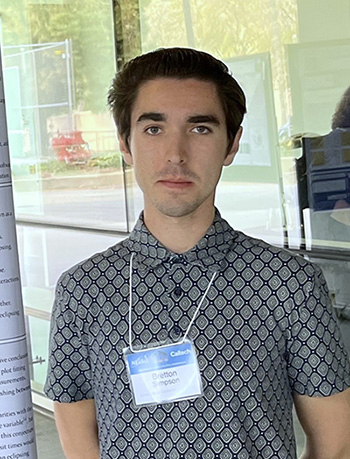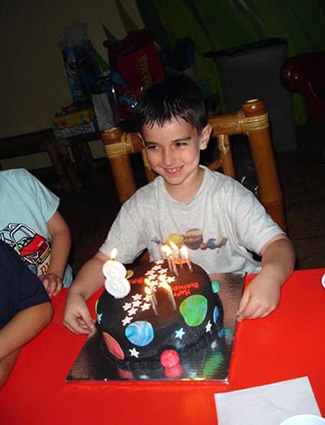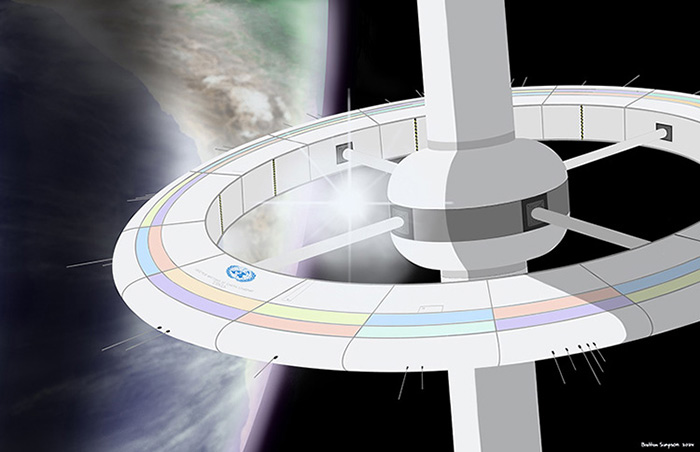Student Spotlight Q&A: Bretton Simpson
March 28, 2024 | By Michelle Franklin
Bretton Simpson is a senior physics major specializing in astrophysics. A part of Shelley Wright’s OIR lab, he has been fascinated by astronomy his entire life. Read this Student Spotlight to learn more about his studies, his hopes for the future and why he thinks the cosmos is too beautiful to give up on.

Q: How did you first become interested in astronomy?
Bretton Simpson: I remember when the Scholastic Book Fair would come around in elementary school, the only books I wanted to read were the space encyclopedias — they really enchanted my imagination and made me want to understand the universe and how it works.
Q: Tell us about what you do in Shelley Wright’s lab.
BS: I work on developing software to process data from the PANOSETI telescopes at the Lick Observatory near San Jose. My code helps subtract interference and identify high-energy photon showers from deep space.
PANOSETI is part of the Optical Infrared Laboratory (OIR), which uses high-energy physics to look at cosmic ray signatures and possible techno-signatures from extraterrestrial intelligent life — everything from practical astronomical applications to theoretical speculative applications. I find it very exciting.
Q: What was a moment when you felt really inspired by the universe?
BS: One that comes to mind was watching documentaries from National Geographic and NOVA. I remember one film — I still have it on DVD — called “Universe: A Journey from Earth to the Edge of the Cosmos.” It describes distances in the universe, starting smaller and ending with the Millennium Simulation, a computer-generated visualization of what the universe may look like on its largest scales.
I remember watching that film as a six-year old thinking how remarkable and large our universe is. The universe is something apart from me, but it’s also something that I’m a part of. I am as much a part of the universe as a star, a hydrogen atom, or even a dandelion seed. I learned that there are countless worlds out there, many of them inhospitable or actively dangerous to life. In all our searching of the thousands of exoplanets [planets orbiting other stars] we've discovered, we have not yet been able to confirm that life exists elsewhere in the universe. I think it contextualizes how precious and profoundly impactful our interactions are here on Earth.

Q: Why did you choose UC San Diego?
BS: I understood it to be a nationally, even globally recognized research university. It had a developed and exciting astronomy program. Physics is also something I'm interested in, so the ability to study physics in conjunction with astronomy and to participate in a research group excited me. It's a place where I could learn about the universe and build connections with people who do that for a living.
Q: Have you faced any challenges in your academic career?
BS: Absolutely. I struggled with the side effects of the pandemic. I’ve discovered that I don't perform well with remote learning. During my sophomore and junior years at UCSD, I didn't have housing on or near campus. I drove from my hometown near Temecula to San Diego almost every day during rush hour traffic — 60 miles each way. It was incredibly difficult. I think I would have had all the justification to drop out and do something easier, but what kept me going was the realization that I had this remarkable opportunity to study astronomy here and I was so close to fulfilling my dreams. I think that the cosmos is too beautiful to give up on.
Now I live in an apartment that’s a short walk to the trolley station and then a quick ride to campus. It’s wonderful.
Q: What are your post-graduation plans?
BS: I applied to some graduate schools but was not accepted into any of their programs. I have been determined to become an astronomer since I was a child, so a few rejections will not stop me. I’m currently applying to post-baccalaureate research opportunities and looking into internships — the kinds of positions where I can continue building my research experience and then ultimately transition into a graduate program where I can earn a PhD in astronomy.
Q: Who is someone who has inspired you?
BS: It's not somebody I've ever met, but it is somebody I've looked up to almost my entire life. When I was in middle school, I was a fairly isolated person and I often had difficulty connecting with people. This was the time I rediscovered my love for astronomy and found the books of Carl Sagan.
He had a way of explaining the world, in its truest context, as a spinning rock in a cold, dark universe, clearly hostile to human life — but so awesome, enormous, and remarkable in its scale and order. Cosmos describes the universe as something that can be understood as opposed to something chaotic as we once believed — whose phenomena was strictly left to the mercy of the gods. He described the cosmos as something we could understand. As something that is beautiful.
I came to understand that science is both intelligent and deeply loving as well. That we're doing this for something. It's important to understand the universe and use the benefits of science and technology to protect the vulnerable people of this planet. To make a life for all people that is more fulfilling and worth living, and to build a community of matter that will last forever.
I recently finished my collection of Sagan’s books — even the more obscure ones. Sagan is not somebody I worship, but he taught me something that changed my life.
Q: What’s your favorite place on campus?
BS: I was just there today! I love the 5th floor of the Student Services Center, close to where they're building the new Triton Center. It’s an open patio with chairs and tables and it’s really peaceful up there. I like being able to sit there and just take in the view.
Q: What are you into right now?
BS: I love to read and make art. I like trying to visualize my ideas through art. I like to think about what the future will look like. How compassionate our species will become in the future. What we'll do to protect those who are vulnerable. How we can do away with the jealousies, the hatreds, and the bigotries that have ruled our planet for millennia. I like to form those thoughts into art to communicate them with others.

